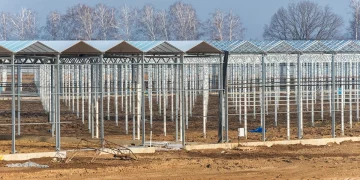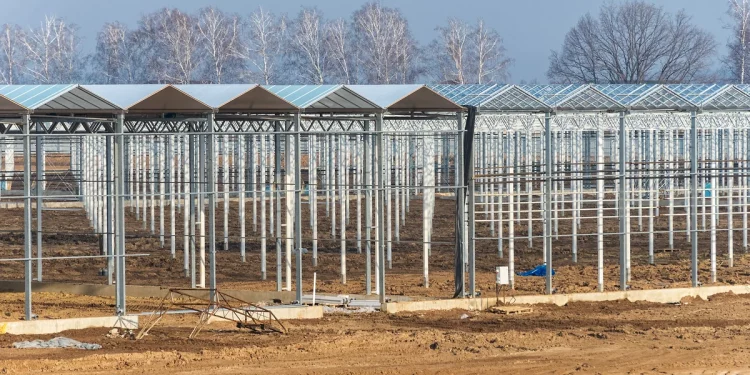In the Voronezh region, the construction of a greenhouse complex for the production of fruits and vegetables in closed ground by Sos Abrahamyan’s Tomat LLC, which began in 2008, has resumed. The capacity of the first two greenhouses, each 6 hectares, is worth 2.2 billion rubles. should be 65 kg / sq. m per year of tomatoes and 110 kg / sq. m per year of cucumbers. Experts point out possible difficulties in competing with major players and fear that the implementation of the project may be hampered by sanctions, since the project is supported by a Dutch company.
In the Bogucharsky district of the Voronezh region, the implementation of the greenhouse project of Tomat LLC by Sos Abrahamyan for the construction of complexes for growing vegetables in greenhouses has been resumed. Kommersant-Chernozemye was told about this in the government of the Voronezh region. At the moment, we are talking about the construction of two complexes of 6 hectares each, which will grow tomatoes, cucumbers, and in the future, perhaps also eggplants and peppers.
Why bankruptcy began in a large greenhouse complex near Kursk
Vegetables will be grown all year round using the Dutch technology with an average productivity of 65 kg/sq. m per year for tomatoes and 110 kg / sq. m per year for cucumbers. The launch cost is estimated at 2.2 billion rubles. Since the beginning of the project, Tomat LLC has already invested 832.6 million rubles. own funds. Sos Abrahamyan told Kommersant-Chernozemye that he expects to launch the first complex on 6 hectares by the end of the year.
As the district administration clarified, the foundations and frames of the greenhouse for 6 hectares and the service area, as well as the storm drain, have already been installed, a warehouse for 600 square meters has been built. m, gas and electric networks for 12 hectares of greenhouses were connected, main contracts were signed with equipment suppliers and contractors. Now the heating system is being installed. Engineering and technical support of the project is carried out by the Dutch Agro Technical Supplies Europe.
The project has been implemented since 2008. At first, the first stage was going to be implemented on a plot of 48.3 hectares, leased for 49 years by the district administration. 36 hectares were envisaged for greenhouse complexes (six complexes of 6 hectares each).
On part of the area in the open ground it was planned to grow fruits and vegetables using land reclamation. In 2012-2016, the project was included among the most significant in the region, but then excluded due to lack of funding. In March 2019, Tomat LLC was declared bankrupt due to a debt of about 10 million rubles. before Sberbank. Then Sos Abrahamyan bought out the creditors’ claims, the company’s bankruptcy was terminated, and in 2021 it became known about its plans to return to the project.
According to Kartoteka.ru, Tomat LLC was registered in the Voronezh region in August 2008. The authorized capital is 175 million rubles. At the end of 2018, zero revenue was recorded, a net loss of 219.1 million rubles. Later financial indicators are not disclosed. The general director and owner of 99.35% is Sos Abrahamyan. Another 0.65% belongs to Armen Hayrapetyan.
Over the past year, several large greenhouse projects have been announced in the Chernozem region. Thus, one of the largest players in the vegetable market “Eco-culture” Alexander Rudakov, Andrey Petrenko and Irina Ashinova announced their intention to build the fourth phase of greenhouses in the Voronezh region – 40 hectares for 15 billion rubles. Ecoproduct LLC of Tatyana Khorosheva plans to build the second stage of the Uspensky greenhouse complex in the Oryol region on 5 hectares with a capacity of 3.26 thousand tons of vegetables per year for 1.6 billion rubles.
And another major player, Sergey Rukin’s Rost Group of Companies, expanded production through the purchase of Belogorya Greenhouses SHP LLC. In June, the Federal Antimonopoly Service granted the petition of the GC structure for the acquisition of another Belgorod asset – Greenhouse LLC, the son of billionaire Roman Abramovich Arkady.
At the same time, several ongoing projects were launched: the first phase of Michurinsky Greenhouse Plant LLC on 32 hectares for 8 billion rubles. with a production volume of 16.9 thousand tons of vegetables in the Tambov region, a new line for the production of oak-leaved lettuce by LLC Greenhouse Combine Yelets Vegetables (Valley of Vegetables brand) on 3.5 hectares with a capacity of 3.5 million pieces. leaf lettuce per year for 1.3 billion rubles. in the Lipetsk region.
The greenhouse vegetable growing industry does not stop in its development, and another confirmation of this is the ongoing implementation of projects for the construction of modern high-tech greenhouses throughout the country, the Institute for Agricultural Market Studies notes. The increase in production areas for 2021 was estimated there at 240 hectares.
According to the research company “Technologies of Growth”, the gross harvest of vegetables in industrial and farm greenhouses in 2021 in six regions of the Chernozem region amounted to 269.4 thousand tons – 18% of the all-Russian harvest in the greenhouses of commercial producers. In the Voronezh region, the collection amounted to 7% of the black earth – 19 thousand tons.
“The indicated investments are quite consistent with the parameters of winter greenhouse projects with fourth or fifth generation light crops with an area of 12 hectares. Payback periods depend on the specific assortment and distribution channels, but in general they usually fit within 11–12 years,” said Tamara Reshetnikova, CEO of Technologies of Growth.
The expert also considers the indicated yield to be quite achievable when using assimilation lighting of sufficient power during the dark season (in the Central Federal District it is at least 6–7 months a year).
Who was going to and changed his mind to lend to the project of the Voronezh “Tomato”
“But for cucumbers in the Central Federal District, there is already a surplus in supply in many areas, so it will not be easy for a new player to enter the cucumber market without price dumping. For tomatoes in the Central Federal District, there is still a shortage of local supply, but in neighboring regions (Lipetsk, Tula) huge tomato greenhouses of Eco-Culture and GK Rost operate, it will be difficult for the new project to compete with such producers, ”says Ms. Reshetnikova, recalling that competition in the greenhouse industry five years ago was an order of magnitude lower.
Market participants indicate possible difficulties with the supply of equipment. “It is possible that the logistical difficulties arising in connection with the sanctions may delay the launch of the project,” one of them said.































